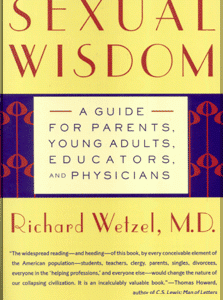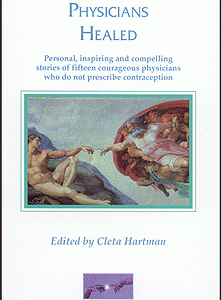Archive for April, 2011
Johnson & Johnson Fails to Protect Employment Rights of Breast Cancer Victims
 Original source
Original source
HLI
A resolution voted on today by Johnson & Johnson (JNJ) shareholders asked JNJ not to discriminate against a job applicant because of her health status. The resolution, which was opposed by JNJ, was voted down by shareholders.
Offered by Human Life International, the resolution was prompted, in part, by the numerous breast cancer survivors who have gone public with their travails to better educate woman about breast cancer and its prevention. In addition to their physical concerns, these courageous women face possible job discrimination because of potential medical liabilities they may pose to future employers. The resolution asks JNJ not to discriminate against these women or others, like AIDS victims, because of their health status. In a letter to shareholders, JNJ recommended shareholders vote against this policy because “The Board (of JNJ) does not believe it is necessary….”
In addition, the resolution highlighted the connection between breast cancer and oral contraceptives by citing a meta-analysis study by Dr. Chris Kahlenborn, which showed 21 out of 23 studies indicated a link between breast cancer and oral contraceptive use. The International Agency on Cancer Research, a branch of the World Health Organization, classified hormonal contraceptives in 2005 as a group one carcinogen, along with asbestos and radium. JNJ sells hundreds of millions of dollars worth of oral contraceptives every year. Dr. Kahlenborn gave a short presentation:
quote
Representing Human Life International’s stockholder resolution
Annual Stockholder’s Meeting, Johnson and Johnson
April 28, 2011
Trenton, NJ
Good Morning. Thank you for the opportunity to address all of you today. Each year, over 200,000 women develop invasive breast cancer in the United States. In regard to Johnson and Johnson, it is good to affirm a resolution that promises not to discriminate against hiring women who have developed breast cancer; but it is not enough. This company has a unique opportunity to be a leader against the fight against breast cancer by working to prevent it.
In October, 2006, four researchers, including myself, published a meta-analysis in the Mayo Clinic Proceedings on the subject of oral contraceptives and pre-menopausal breast cancer (1). After reviewing all of the world’s data, we found that 21 out of 23 studies showed an increased risk of developing invasive premenopausal breast cancer if women took oral contraceptives prior to the birth of their first child, which is when most women take them. These women incurred a 44% increased risk, which rose to 52% if they took them for at least 4 years prior to the birth of their first child. Both of these results were significant at the 99% confidence interval-the highest standard used in research. In addition we noted that the World Health Organization had recently classified oral contraceptives as a Group I carcinogen-the most dangerous type known to humankind (2).
Recently our study was quoted in the Frontiers of Medicine in China (3) whose researchers performed their own meta-analysis and found that women who took oral contraceptives sustained a 112% increased risk in developing breast cancer. In addition, a recent collaborative study co-authored by investigators from the National Cancer Institute, the Hutchinson Cancer Center and the University of Washington cited our meta-analysis and also noted significant breast cancer risk with oral contraceptives (4).
In conclusion, I note that there are three good reasons for you to consider the alternative of ceasing all hormonal contraceptive sales while specifically and publicly citing the breast cancer risk:
1) Limitation of bad press. Instead of picking up Bloomberg Businessweek and cringing you would be a step ahead of the curve and your competitors and would be seen as a leader. People want to see Johnson and Johnson as a company that makes safe products like your shampoo-not products that are becoming controversial, such as oral contraceptives.
2) Limitation of future lawsuits: Suits against the thrombotic potential of oral contraceptives are increasing and the breast cancer link may well be the next frontier.
3) It is the right thing to do. I ask the executives and board members of Johnson and Johnson to simply ask yourselves one question: knowing what you know today, would you be comfortable if your wife or daughter were to take Johnson and Johnson’s hormonal contraceptive pills?
Thank you for your time and attention. I will be available for questions and this presentation and its sources will be posted on the Human Life International website. I have a couple of extra copies for those interested here.
Chris Kahlenborn, MD
Sources:
1) Mayo Clin Proc. 2006;1290-1302.
2) IARC Monographs. July 29, 2005.
unquote
“I took birth control for years, and I have to wonder if it caused my breast cancer. I also have a niece who was on birth control and at 19 had a stroke due to blood clotting aggravated by the pill,” said Bonnie Borel-Donohue, a breast cancer survivor, in response to the vote. “Having profited for years from the sale of carcinogenic and stroke-provoking birth control products, JNJ should see that this resolution is but the smallest step it could have taken to rectify the injustices and harms suffered by unsuspecting users/victims of their birth control products.”
Mother Teresa on NFP
 “The way to plan the family is Natural Family Planning, not contraception. In destroying the power of giving life, through contraception, a husband or wife is doing something to self. This turns the attention to self and so destroys the gift of love in him or her. In loving, the husband and wife must turn the attention to each other. Once that living love is destroyed by contraception, abortion follows very easily.”
“The way to plan the family is Natural Family Planning, not contraception. In destroying the power of giving life, through contraception, a husband or wife is doing something to self. This turns the attention to self and so destroys the gift of love in him or her. In loving, the husband and wife must turn the attention to each other. Once that living love is destroyed by contraception, abortion follows very easily.”
~ Blessed Mother Teresa (in front of Bill and Hillary Clinton)
H/T to CatholicFire for the quote.
From nfpworksblog.
The Cross in Our Bodies
From a Doctor
A couple of days ago I was running (I use that term very loosely) on my treadmill, watching a DVD sermon by Louie Giglio…and I was BLOWN AWAY!
[youtube=http://www.youtube.com/watch?v=F0-NPPIeeRk]
I want to share what I learned….but I fear not being able to convey it as well as I want.
I will share anyway.
He (Louie) was talking about how inconceivably BIG our God is…how He spoke the universe into being…how He breathes stars out of His mouth that are huge raging balls of fire…etc. etc. Then He went on to speak of how this star-breathing, universe creating God ALSO knitted our human bodies together with amazing detail and wonder. At this point I am LOVING it (fascinating from a medical standpoint, you know.) …..and I was remembering how I was constantly amazed during medical school as I learned more and more about God’s handiwork. I remember so many times thinking….”How can ANYONE deny that a Creator did all of this???”
Louie went on to talk about how we can trust that the God who created all this, also has the power to hold it all together when things seem to be falling apart…how our loving Creator is also our sustainer.
And then I lost my breath.
And it wasn’t because I was running my treadmill, either!!!
It was because he started talking about laminin.
I knew about laminin. Here is how wikipedia describes them :”Laminins are a family of proteins that are an integral part of the structural scaffolding of basement membranes in almost every animal tissue.” You see….laminins are what hold us together….LITERALLY. They are cell adhesion molecules. They are what holds one cell of our bodies to the next cell. Without them, we would literally fall apart. And I knew all this already. But what I didn’t know is what laminin LOOKED LIKE.
But now I do. And I have thought about it a thousand times since (already)….
Here is what the structure of laminin looks like…AND THIS IS NOT a “Christian portrayal” of it….if you look up laminin in any scientific/medical piece of literature, this is what you will see…
Now tell me that our God is not the coolest!!!
Amazing.
The glue that holds us together….ALL of us….is in the shape of the cross.
Immediately Colossians 1:15-17 comes to mind.
“He is the image of the invisible God, the firstborn over all creation.
For by him all things were created; things in heaven and on earth , visible and invisible,
whether thrones or powers or rulers or authorities;
all things were created by him and for him.
He is before all things,
and in him all things HOLD TOGETHER. ”
Colossians 1:15-17
Call me crazy. I just think that is very, very, very cool.
Thousands of years before the world knew anything about laminin, Paul penned those words. And now we see that from a very LITERAL standpoint, we are held together…one cell to another….by the cross.
You would never in a quadrillion years convince me that is anything other than the mark of a Creator who knew EXACTLY what laminin “glue” would look like long before Adam even breathed his first breath!!
Praise the Lord!!!!!!!!!!!!!!!!!!
The Word Became Flesh
Taken from Northern Kentucky Right To Life Newsletter Vol. 40, No. 2 April 2011
 U.S. Rep. Nancy Pelosi (D) (Speaker of the U.S. House until her party was overwhelmingly turned out by the voters last November) made an interesting remark in a press briefing at a Catholic Community Conference on Capitol Hill, where she said that her favorite word was “the word, as in the Word made flesh.” She added that people have to give voice to “what that means in terms of public policy that would be in keeping with the values of the Word.”
U.S. Rep. Nancy Pelosi (D) (Speaker of the U.S. House until her party was overwhelmingly turned out by the voters last November) made an interesting remark in a press briefing at a Catholic Community Conference on Capitol Hill, where she said that her favorite word was “the word, as in the Word made flesh.” She added that people have to give voice to “what that means in terms of public policy that would be in keeping with the values of the Word.”
Her remark led to a very embarrassing question put to her then at a later press briefing by CNS News reporter Jane McGrath: “So, when was the Word made flesh? Was it at the Annunciation, when Jesus was conceived by the power of the Holy Spirit, as the Creator says, or was it at the Nativity when He was born of the Virgin Mary? And when did the Word get the right to life?” Pelosi’s evasive answer to her obvious hypocritical position favoring the destruction of unborn children was that the question just put to her is one that “we talk about in church, and that’s where I’d like to talk about that.”
Holy See to UN: Fertility Shouldn’t Be Feared
Points to Flawed Population Control Policies
 NEW YORK, 2011 (Zenit.org).- The Holy See’s permanent observer to the United Nations is challenging the erroneous view that human fertility and population growth is something to be feared.
NEW YORK, 2011 (Zenit.org).- The Holy See’s permanent observer to the United Nations is challenging the erroneous view that human fertility and population growth is something to be feared.
Archbishop Francis Chullikatt stated this Tuesday in an address to the 44th Session of the Commission on Population and Development in a meeting on “Fertility, Reproductive Health and Development.”
He noted, “Unfortunately many discussions in the present day continue to be led by a false notion that, in the context of population growth, the very act of giving life is something to be feared rather than affirmed.”
“Such thinking is based on a radical individualism,” the prelate said, “which sees human reproduction as a commodity that must be regulated and improved in order to encourage greater market efficiency and development.”
He continued: “How can such a view be consistent with the objectives of the United Nations? Put most candidly, it cannot.”
The archbishop asserted that “this flawed understanding leads to the distorted view that population growth, especially among the poor, must be decreased in order to address poverty, illiteracy and malnutrition.”
“It is also based upon the consistently disproven theory that population increase will devastate the environment, lead to global competition and confrontation for resources and undermine the ability of women to interact fully with society,” he said.
Human sexuality
“These apprehensions contribute to the advancement of forms of reproductive technology which denigrate the nature of human sexuality,” Archbishop Chullikatt noted.
He observed that “the combination of these misconceptions have led some national governments to adopt laws and policies which discourage parents from exercising their fundamental and non-derogable right to have children free of coercion and which even make it illegal for mothers to give birth in some cases or for a child to have one’s own brothers and sisters.”
The prelate urged, “Instead of focusing political and financial resources on efforts to reduce the number of poor persons through methods which trivialize marriage and the family and deny the very right to life of unborn children, let us instead focus these resources on providing the promised development assistance to the approximately 920 million people living on less than $1.25 per day.”
He continued: “Let us feed the nearly 1 billion people who are malnourished, and let us provide skilled birth attendants at every birth to reduce the incidents of maternal and child morality.
“Let us achieve our promise of providing primary education to the 69 million children who risk becoming another generation without such basic assistance.”
The archbishop concluded, “These children of today will be the citizens of tomorrow who have much to contribute to the welfare and common good of all.”
Full text: www.zenit.org/article-32314?l=english
Ohio College bans abortion literature
April 14, 2011
 One More Soul representative Ethel Borel-Donahue recently distributed several copies of OMS pamphlet “Breast Cancer Risk from Abortion” to her classmates at Sinclair Community College in Dayton, Ohio. The college responded by emphasizing its policy that no literature may be distributed in classrooms and other “working areas” of the college. This action and the related policy raise important questions about free speech by students on campus.
One More Soul representative Ethel Borel-Donahue recently distributed several copies of OMS pamphlet “Breast Cancer Risk from Abortion” to her classmates at Sinclair Community College in Dayton, Ohio. The college responded by emphasizing its policy that no literature may be distributed in classrooms and other “working areas” of the college. This action and the related policy raise important questions about free speech by students on campus.
UPDATE FROM:
WorldNETDaily
Sinclair Community College has ordered a student not to distribute pamphlets highlighting breast cancer’s link to abortion and oral contraceptives, drawing a challenge that cites, among other things, the idea of free speech.
The confrontation began during Breast Cancer Awareness Month in October of 2010 when Ethel Borel-Donohue, a paralegal studies student, shared two sets of roughly 15 pamphlets after a class.
The pamphlets, published by a Catholic organization, asserted overwhelming evidence that abortion and oral contraceptives substantially increase a woman’s risk of developing breast cancer.
But the chairman of the department, Michael Brigner, censored the material from all class areas after a complaint from a fellow student who had had an abortion. And in doing so, he revealed Sinclair’s broad constraints on free speech, which go well beyond the classroom and this particular incident.
From Sinclair’s policy on social and commercial activity:
“Literature may not be distributed in working areas, including: classrooms, laboratories, lecture halls, gymnasiums, libraries, offices, work stations, conference rooms, and corridors leading directly thereto which are an integral part of the work areas.”
“So you can distribute literature, but you just can’t do it anywhere,” jibed Borel-Donohue. “I’ve been to several universities, but Sinclair, it seems, is really totalitarian in their control.”
Read more: Ohio College bans abortion literature http://www.wnd.com/?pageId=286785
UPDATE FROM:
Foundation of Individual Rights in Education
Ohio College Prohibits Student from Peacefully Distributing Literature on Abortion, Birth Control
Sinclair Community College has banned a student from distributing literature about abortion, birth control, and breast cancer to her classmates after class. The college also bans all distribution of literature on vast areas of campus. Student Ethel Borel-Donohue, who never disrupted class with her literature, came to FIRE for help.
Read Full Article
Pastoral Care of Couples Who are Cohabitating — Cuidado Pastoral para las Parejas Que estan Cohabitando
By Most Rev. Michael J. Sheehan
Archbishop of Santa Fe

Dear Brothers and Sisters in Christ,
We are all painfully aware that there are many Catholics today who are living in cohabitation. The Church must make it clear to the faithful that these unions are not in accord with the Gospel, and to help Catholics who find themselves in these situations to do whatever they must do to make their lives pleasing to God.
First of all, we ourselves must be firmly rooted in the Gospel teaching that, when it comes to sexual union, there are only two lifestyles acceptable to Jesus Christ for His disciples: a single life of chastity, or the union of man and woman in the Sacrament of Matrimony. There is no “third way” possible for a Christian. The Bible and the Church teaches that marriage is between one man and one woman and opposes same sex unions.
We have three groups of people who are living contrary to the Gospel teaching on marriage: those who cohabit; those who have a merely civil union with no previous marriage; and those who have a civil union who were married before. These people are objectively living in a state of mortal sin and may not receive Holy Communion. They are in great spiritual danger. At the best – and this is, sadly, often the case – they are ignorant of God’s plan for man and woman. At the worst, they are contemptuous of God’s commandments and His sacraments.
Of these three groups, the first two have no real excuse. They should marry in the Church or separate. Often their plea is that they “cannot afford a church wedding” i.e. the external trappings, or that “what difference does a piece of paper make?” – as if a sacramental covenant is nothing more than a piece of paper! Such statements show religious ignorance, or a lack of faith and awareness of the evil of sin.
The third group, those who were married before and married again outside the Church, can seek a marriage annulment and have their marriage blest in the Church. Please remember that divorce still is no reason to refrain from Holy Communion as long as they have not entered into another marriage or sinful relationship. Many Catholics are confused on this point.
Christ our Lord loves all these people and wishes to save them – not by ignoring their sin, or calling evil good, but by repentance and helping them to change their lives in accordance with His teaching. We, as His Church, must do the same. In accord with this, I would remind you of the following:
1. People in the above three situations cannot receive the Sacraments, with the important exception of those who agree to live chastely (“as brother and sister”) until their situation is regularized. Of course, those in danger of death are presumed to be repentant.
2. These people may not be commissioned as Extraordinary Ministers of Holy Communion, not only because of scandal, but even more because one commits the sin of sacrilege by administering a Sacrament in the state of mortal sin.
3. Nor are such people to be admitted to the role of sponsor for Baptism or Confirmation, as is clearly stated on the Archdiocesan Affidavit for a Sponsor. It is critical for the sponsor to be a practicing Catholic – and can anyone be seriously called a practicing Catholic who is not able to receive the sacraments because they are living in sin?
4. When it comes to other parish ministries and organizations, I feel it best to leave these situations to the judgment of the pastor. Prudence is needed, avoiding all occasions of scandal. We must see their involvement in the parish as an opportunity to work urgently to bring such people to repentance and the regularization of their lifestyle.
5. Many of these sins are committed out of ignorance. I ask that our pastors preach on the gravity of sin and its evil consequences, the 6th and 9th Commandments of God, and the sacramental nature and meaning of Christian marriage. Our catechetical programs in our parishes – children, youth, and adult – must clearly and repeatedly teach these truths.
A Church wedding does not require some lavish spectacle and entertainment costing vast sums of money (Indeed, how often we have seen the most costly weddings end in divorce in but a few months or years!). While beauty and joy should surround a Christian wedding, we must remind everyone that it is a sacrament, not a show.
6. Those who are married outside the Church because of a previous union are urged to seek an annulment through our Marriage Tribunal. If it can be found that the first marriage lacked some essential quality for a valid marriage, the Tribunal can grant an annulment. Your pastor can help someone start a marriage case for this purpose. It is important for such couples to continue to pray and get to Mass even though they may not receive Communion, until their marriage can be blest in the Church.
Our popular American culture is often in conflict with the teachings of Jesus and His Church. I urge especially young people to not cohabitate which is sinful, but to marry in the Church and prepare well for it.
I congratulate and thank those thousands of Catholic married couples who role model the Sacrament of Marriage according to the teachings of Jesus and his Church.
Sincerely yours in the Risen Lord,
Most Rev. Michael J. Sheehan
Archbishop of Santa Fe








Five Truths about Planned Parenthood
by Charmaine Yoest
She said she wanted to address “misperceptions” about the abortion-industry giant. She was joined in her goal on the front page of the Washington Post by reporter Sandhya Somashekhar, who painted a picture of Planned Parenthood that minimized the role abortion plays at the organization’s health-care affiliates.
In presenting Planned Parenthood as mainly focused on prevention, Ms. Coleman neglects to mention several statistics, gleaned from the organization’s own annual reports and fact sheets, that illustrate its heavy (and increasing) involvement in abortion, as well as its practices that routinely place women’s health and safety secondary to its own bottom line.
While the Washington Post declined to present an alternative to the Planned Parenthood way of thinking, there are a multitude of other facts to consider. To add to the discussion of whether Planned Parenthood should continue to be funded, let’s consider five truths about an industry that receives more than $360 million in taxpayer subsidies annually.
1. Planned Parenthood is the nation’s largest abortion provider, performing (and profiting from) one out of every four abortions in the United States.
In 2009, abortion was a “service” that Planned Parenthood provided to 12 percent of its patients overall, and to 97.6 percent of its patients who reported themselves pregnant. It performed 332,278 abortions in that one year alone. That is an average of 910 abortions each and every day.
Since the average cost of an early surgical abortion was $451 (according to the Guttmacher Institute, Planned Parenthood’s former “special affiliate”), abortion accounted for approximately 37 percent of Planned Parenthood’s health-care-center income in 2009. And that figure — nearly $150 million in revenue from abortion — is a low estimate, considering that Planned Parenthood also performs later and more expensive abortions.
In terms of time, money, and unduplicated patients — rather than the bloated “services” rhetoric — abortion contributes significantly more than the 3 percent Ms. Coleman implies to Planned Parenthood’s bottom line.
2. Planned Parenthood increases its abortion numbers with each passing year, bucking the nearly 20-year national trend of a decreasing abortion rate.
Today, Planned Parenthood performs nearly double the number of abortions it did in 1999. And over the last twelve years — during which the amount of taxpayer funding Planned Parenthood receives has, coincidentally, also doubled — it has dramatically reduced the other pregnancy-related services it provides. In 2009, Planned Parenthood made referrals for only 997 adoptions, in contrast to the 2,999 referrals it made in 1999. Similarly, Planned Parenthood’s clients for prenatal care dropped from 18,878 to only 7,021.
Abby Johnson, the former director of Planned Parenthood’s clinic in Bryan, Texas, reports that, in 2009, her clinic was given an increased abortion quota in order to raise revenue. (According to Mrs. Johnson, “the assigned budget always included a line for client goals under abortion services.”) Mrs. Johnson has said that her superiors gave her “the clear and distinct understanding that I was to get my priorities straight, that abortion was where my priorities needed to be because that’s where the revenue was.”
The latest annual report for the affiliate Ms. Coleman headed before she assumed her current post, Planned Parenthood of Mid-Hudson Valley (PPMHV), seems to corroborate Mrs. Johnson’s claim that Planned Parenthood is increasing abortion services with an eye toward increased revenue. PPMHV is relocating its consolidated clinics to open larger and more “modern” facilities, which, notably, have “the addition of surgical abortion services.” The PPMHV report “anticipates” that these new centers will lead to “increasing our revenue and sustainability.”
Planned Parenthood’s new use of Skype to dispense abortion-inducing drugs and its mandate that all affiliates provide abortion services by 2013 also indicate that the organization wants its abortion-increasing trend to continue.
3. Planned Parenthood affiliates have failed to be good stewards of taxpayer funds.
In some cases where Planned Parenthood has not been legally allowed a “financial cushion” through a government health-care program, it has felt entitled to build one for itself. For example, a California audit report showed that in one year alone Planned Parenthood of San Diego and Riverside Counties received $5 million more than it should have because of improper billing practices.
And contrary to Ms. Coleman’s claim, Planned Parenthood does have sources of money other than the government dole. In fact, for its fiscal year ending June 30, 2009, Planned Parenthood Federation of America (PPFA) and its affiliates reported receiving $308.2 million in “Private Contributions and Bequests.” It also made $404.9 million in “Health Center Income.” Though individual affiliates have recorded losses, Planned Parenthood overall reported an “excess of revenue over expenses” of $63.4 million in 2009.
4. Planned Parenthood fights reasonable laws to protect women and girls because such laws might undermine its ability to make money.
Planned Parenthood’s consistent and financially motivated opposition to federal and state legislation designed to protect women and girls makes clear that its abortion business trumps its professed concern for these women and girls. Just this spring, a Planned Parenthood affiliate in Illinois fought a bill to make reporting of sex abuse mandatory, because Planned Parenthood allegedly feared that the legislation might overload the responsible agency with too many cases of suspected abuse.
Planned Parenthood’s longstanding efforts across the nation to overturn common-sense laws that safeguard women’s health and safety further underscore the organization’s pattern and practice of refusing to make caring for women a priority. Just a few years ago, Planned Parenthood challenged a Missouri law that required abortion clinics to meet the same standards as the ambulatory-surgery centers in the state. Its reason? Bringing its clinics into compliance with these medically accepted standards would be prohibitively costly.
5. Planned Parenthood partners with those who sexually abuse and exploit women and girls.
Substantial evidence suggests that Planned Parenthood — far from being a defender of women and girls — defends and abets those who sexually abuse and exploit them. Planned Parenthood has shown itself to be a perfect partner to the pimp, sex trafficker, or child abuser. It hides his crimes through its willful failure to report suspected sexual abuse of children to authorities and its refusal to comply with parental-involvement laws. For example, Planned Parenthood of Central and Northern Arizona was found negligent and civilly liable for failing to report the sexual abuse of a young girl who was being raped by her foster brother, and Planned Parenthood Minnesota/North Dakota/South Dakota was fined $50,000 for ignoring Minnesota’s parental-notice law. Planned Parenthood’s failure to intervene in cases of abuse reflects a lack of concern for the women and girls who go to Planned Parenthood seeking trustworthy care and counsel.
One of Ms. Coleman’s five “myths” is the assertion that “People do not really need Planned Parenthood.” The truth is this: People do not need Planned Parenthood to stay in the abortion business (nor to annually increase its stake in it). People do not need Planned Parenthood to protect adult men who prey on and abuse young girls. People do not need Planned Parenthood’s anti-woman, bottom-line-oriented view that pushes abortion at the expense of women’s health and safety. Above all, people do not need Planned Parenthood’s scandal-ridden and abortion-heavy business practices to be subsidized by taxpayer dollars.
Posted in News & Commentary | No Comments »